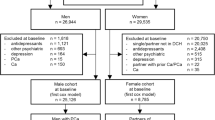Abstract
Background
Previous research has shown that as people age, distress decreases despite an increase in prevalence of medical comorbidity. This could be due to increased use of psychotropic medications with comorbidity. We tested this hypothesis in older adults.
Methods
Information from medical records of older adults (65 to 99 years of age) in the following groups was collected: women with breast cancer (n = 2359), women without any cancer diagnosis (n = 27,161), men with prostate cancer (n = 2686), and men without any cancer diagnosis (n = 21,014). We collected fills of antidepressant or sedative medications, diagnosis of depression in the year of cancer diagnosis, and Charlson Comorbidity Index from the year before cancer.
Results
Women with breast cancer were more likely to fill psychotropic prescriptions (both ps < 0.02) or be diagnosed with depression (p < 0.001) than women without cancer. Men with prostate cancer were more likely to fill these prescriptions or receive a diagnosis of depression than men without cancer (ps < 0.05). Charlson was related to increased odds of filling both types of medication in women with breast cancer and men with prostate cancer (ps < 0.001). Comorbidity was related to greater odds of receiving a depression diagnosis in men with prostate cancer (p < 0.001) but not women with breast cancer (p > 0.15).
Conclusions
Older adults with breast or prostate cancer are more likely to fill psychotropic medication prescriptions and receive a depression diagnosis than those without cancer. Comorbidity increased the likelihood of medication fills in older adults with cancer. As this population experiences polypharmacy, nonpharmacologic treatments for depression may need to be considered.
Similar content being viewed by others
References
Mitchell AJ, Chan M, Bhatti H, Halton M, Grassi L, Johansen C et al (2011) Prevalence of depression, anxiety, and adjustment disorder in oncological, haematological, and palliative-care settings: a meta-analysis of 94 interview-based studies. Lancet Oncol 12(2):160–74
Charles ST (2010) Strength and vulnerability integration: a model of emotional well-being across adulthood. Psychol Bull 136(6):1068–91
Urry HL, Gross JJ (2010) Emotion regulation in older age. Curr Dir Psychol Sci 19(6):352–7
Braun IM, Rao SR, Meyer FL, Fedele G (2014) Patterns of psychiatric medication use among nationally representative long-term cancer survivors and controls. Cancer 121:132–138. doi:10.1002/cncr.29014
Suppli NP, Deltour I, Damkjaer LH, Christensen J, Jensen AB, Kroman NT et al (2011) Factors associated with the prescription of antidepressive medication to breast cancer patients. Acta Oncol 50(2):243–51
Ashbury FD, Madlensky L, Raich P, Thompson M, Whitney G, Hotz K et al (2003) Antidepressant prescribing in community cancer care. Support Care Cancer 11(5):278–85
Ng CG, Boks MP, Smeets HM, Zainal NZ, de Wit NJ (2013) Prescription patterns for psychotropic drugs in cancer patients; a large population study in the Netherlands. Psychooncology 22(4):762–7
Salive ME (2013) Multimorbidity in older adults. Epidemiologic reviews
Noel PH, Frueh BC, Larme AC, Pugh JA (2005) Collaborative care needs and preferences of primary care patients with multimorbidity. Health Expect Int J Public Participation Health Care Health Policy 8(1):54–63
Mitchell AJ, Ferguson DW, Gill J, Paul J, Symonds P (2013) Depression and anxiety in long-term cancer survivors compared with spouses and healthy controls: a systematic review and meta-analysis. Lancet Oncol 14(8):721–32
Rosenberg D, Grothaus L, Arterburn D (2014) Characteristics of older adult physical activity program users. Am J Manag Care 20:e245–e2459.
Charlson ME, Pompei P, Ales KL, MacKenzie CR (1987) A new method of classifying prognostic comorbidity in longitudinal studies: development and validation. J Chronic Dis 40(5):373–83
Ahern TP, Bosco JL, Silliman RA, Yood MU, Field TS, Wei F et al (2009) Potential misinterpretations caused by collapsing upper categories of comorbidity indices: an illustration from a cohort of older breast cancer survivors. Clin Epidemiol 1:93–100
Casault L, Savard J, Ivers H, Savard MH, Simard S (2012) Utilization of hypnotic medication in the context of cancer: predictors and frequency of use. Support Care Cancer 20(6):1203–10
Ell K, Sanchez K, Vourlekis B, Lee PJ, Dwight-Johnson M, Lagomasino I et al (2005) Depression, correlates of depression, and receipt of depression care among low-income women with breast or gynecologic cancer. J Clin Oncol 23(13):3052–60
Wu SM, Brothers BM, Farrar W, Andersen BL (2014) Individual counseling is the preferred treatment for depression in breast cancer survivors. J Psychosoc Oncol. 32:637–646. doi:10.1080/07347332.2014.955239
Acknowledgments
Dr. Jones is supported by a fellowship from the National Institute on Aging (T32 AG027677).
Conflict of interest
The authors do not have any conflict of interest to report.
Author information
Authors and Affiliations
Corresponding author
Rights and permissions
About this article
Cite this article
Jones, S.M.W., Rosenberg, D., Ludman, E. et al. Medical comorbidity and psychotropic medication fills in older adults with breast or prostate cancer. Support Care Cancer 23, 3005–3009 (2015). https://doi.org/10.1007/s00520-015-2668-y
Received:
Accepted:
Published:
Issue Date:
DOI: https://doi.org/10.1007/s00520-015-2668-y




